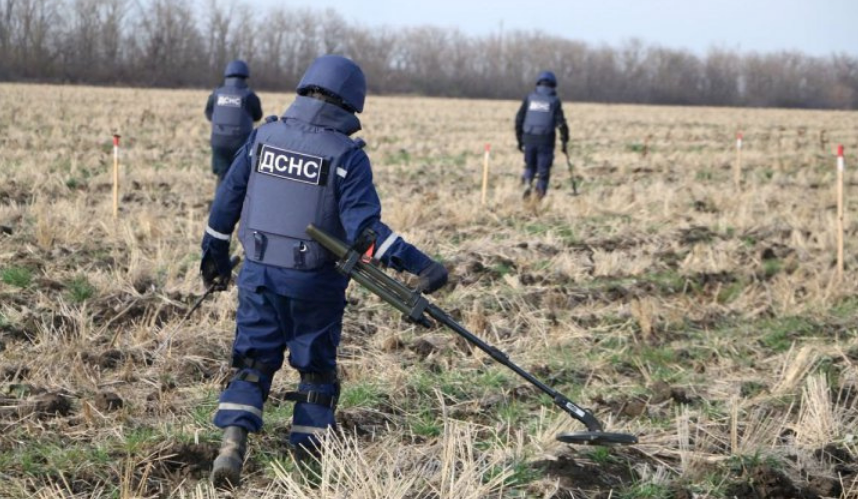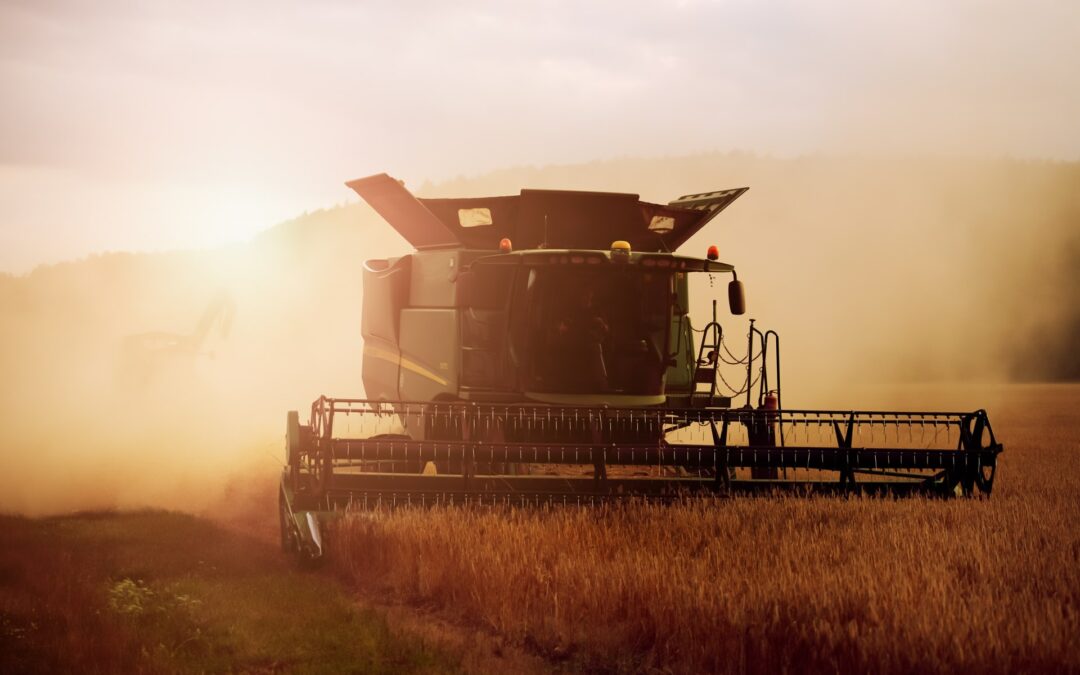One of the activities of our Kharkiv Fusilli team during the war is monitoring and analysing the situation with the sowing campaign in the Kharkiv region. Today, we have the following situation in our region: despite the continuation of the war, the sowing campaign continues. Farmers are trying to sow about 60% of the total sown area. However, there are enough challenges that cannot be solved quickly, so the sowing campaign is still facing problems.
Temporarily occupied territories
Part of the Kharkiv region is under occupation by Russian invaders. Accordingly, the beginning of the sowing campaign there is postponed. In these areas, which are located in the north-eastern direction, agricultural machinery is stolen, grain is exported, and so on.
Mined fields
During the hostilities in the region, a large number of fields were damaged, in particular due to constant artillery shelling, mortar shelling and more. As a result, the fields need demining, as well as the removal of explosives that remained there. In some places it can be done immediately and the sowing campaign can start. In other places it is impossible to do so, because the shelling continues or the area is very close to hostilities. There is a concern that some parts of the land will not fully recover for many decades. There will be no landmine removal and the soil will be unsuitable for cultivation. In some districts, these fields simply remain as they are due to lack of funding. This will lead to a reduction in sown areas, job losses in the regions, and migration of labor to other regions or countries. Also, all war actions damage the land:
- Explosive funnels from missiles and shells. There are hundreds of explosive funnels. Each of them is a huge crater. The field becomes “dirty” and shells are a metal that stays in the ground. Hundreds and thousands of landmine debris remain in the ground and will be oxidized. There are tons of chemicals from explosions that are literally poisoning the soil. A culture that will grow here – if it grows – becomes contaminated.
- Chemical and physical soil pollution. After the explosion, the ground shrank and compacted. It is less permeable to moisture. Moreover, it is well dried by winds. All the vegetation is destroyed, as it will take years to recover. The same is true of the animals that have lived here and that no longer exist. The entire soil ecosystem is destroyed, causing the soil to degrade. This is also the case when a tank, or artillery simply crosses the field and removes the top layer, which is a very important part of the ground.
- Destruction of the organic component of the soil;
- Soil erosion (weathering, drying);
- Unsafe future uses (unexploded ordnance). This field is also dangerous.
As we described above, there are the shells that exploded and now only damage the soil. But how many of them did not explode and can detonate when a tractor hits them? No one knows. Meanwhile, every week there is news about farmers affected by landmines”[1]).

Problems with fuel and fertilizers
Strikes on oil depots and refineries, railway junctions of our country also called into question the sowing campaign. Farmers need a lot of fuel to go to the fields and start sowing them. The government and local authorities are already working to address this issue, but it will take time and new logistical fuel supply routes. Accordingly, it also slows down the sowing campaign.
However, despite the rather difficult situation, agrarians of Kharkiv region assure that the sowing campaign will take place and they will do their best to ensure Ukraine’s food policy.
The impact of the war on the food security worldwide
The war has an impact not only on Ukraine’s food security, but also on the world as a whole. Here are some examples of negative consequences, namely the problems of production and supply of edible oil, dairy products and cereals (all these are the main resources of the agro-industrial system of the Kharkiv region).
It is worth noting that as of 2021, Ukraine was among the top five suppliers of agricultural products to the EU. Like the food industry, the global cosmetics sector is battling the effects of the war. The fact is that producers use alcohol extracted from grain and organic beets (for perfume production). And vegetable oil is used for the production of cosmetics. That is, those crops that are exported from Ukraine. Amber Martone, vice president of Italian perfume production at ICR (which includes Bulgari, Salvatore Ferragamo, Trussardi and others), says the cost of essential alcohol is rising by 30% [2]. One of the brightest examples of the consequences due to the problems of production and supply of dairy products is the farm of Kherson region. Before the war, the farm had an area of 1.5 thousand hectares and produced 10 tons of milk daily. The milk was delivered to the French company Lactalis, where it produced the well-known President butter. Currently, the farm is under occupation and does not have the ability to export products [3]. Sunflower oil is one of the industry standards for the production of snacks, such as potato chips. The founder of The British Snack Company, which produces potato chips and supplies them to pubs, said in an interview that sunflower oil is a key ingredient after potatoes. Now, due to sales restrictions, the company has been forced to switch to rapeseed oil, which is three times more expensive than sunflower oil [4].
Not only businesses and industries, but also ordinary people in the United Kingdom have faced problems with the supply of solar oil. Supermarkets across the country have imposed temporary restrictions on the retail sale of vegetable oil. Yes, the Tesco network allows you to sell three units of goods per consumer, and Waitrose and Morrisons have set a limit of two units [5].
According to Human Rights Watch, the war has affected the food security of many African countries. The reason for this is that many countries in East, West, Central and even South Africa depend on Ukraine and russia for a significant percentage of imports of wheat, fertilizers and vegetable oils. However, due to the war, trade flows to Africa are disrupted and this affects pricing policy: prices (for food), which have so far been raised through COVID, are now rising even higher. This applies not only to those countries where the percentage of imports from Ukraine and Russia is quite high, but also to those who import little, because prices are affected by rising world prices for key goods. “The food price index of the Food and Agriculture Organization of the United Nations, which measures the monthly change in international prices for a basket of food products, rose by 12.6% from February to March. The March index is the highest since this figure was created in the 1990s.”
Ukraine is one of the world’s five largest exporters of barley, sunflower and corn, accounting for about a third of the world’s wheat exports. Nigeria, the world’s fourth largest importer of wheat, receives a quarter of its imports from Russia and Ukraine. Cameroon, Tanzania, Uganda and Sudan receive more than 40% of their wheat imports from Russia and Ukraine. The United Nations World Food Program (WFP) buys half of Ukraine’s wheat, which it distributes worldwide. With the war, supplies declined and prices rose, including for fuel, and the cost of transporting food to the region increased. In 2021, Ukraine was the largest single source of food for the United Nations World Food Program. Many countries, from East to West Africa, are already struggling with rapid international prices for food, fuel and fertilizers. As the war in Ukraine and economic sanctions against Russia stifle food production and trade, the deficit is widening and food prices are rising as a result of food speculation. Ukraine is one of the cheapest exporters on the market. This has made it very attractive to low-income countries. Now delivery is complicated. Meanwhile, food, oil and delivery prices continue to rise.
[1] From @pobedyn_official
[2] https://www.reuters.com/business/european-cosmetics-makers-face-supply-crisis-amid-scarcity-ukraine-resources-2022-04-12/?fbclid=IwAR2RZjEWm-H2OWdBVgdilsS0FWi_-ODENncaHnFzfuDjmBDC41maJHSu0nI
[3] https://agravery.com/uk/posts/show/krah-sistemi-ak-rosijsko-ukrainska-vijna-vdarit-po-prodovolcij-bezpeci-evropi?fbclid=IwAR1nrmHOKJ5fs86jEZfyYjdw2pnr7JH6ODfggstrZISBfGEzJJZxppKpUuw
[4] https://www.infobae.com/ua/2022/04/24/the-united-kingdom-limited-the-purchase-per-customer-of-cooking-oil-due-to-the-war-in-ukraine/?fbclid=IwAR3t_twMcOdNarNU9TfTJyCoK_D5DCvwCXpKWvthLdrbA4A_AZnSJdZv3Xg
[5] https://www.bloomberg.com/news/articles/2022-04-23/supermarkets-limit-cooking-oil-purchases-after-supplies-hit-by-ukraine-war?srnd=premium-europe&fbclid=IwAR0D2eT9-wtmbmgUWkBkVNgat23rwhzJIEUCbTsFWOuz0ALx63ZQZsUdwfg
Author: Olena Muradyan (V.N. Karazin Kharkiv National University)
Photo Credits: Robert Wiedemann on Unsplash; FUSILLI team Kharkiv
